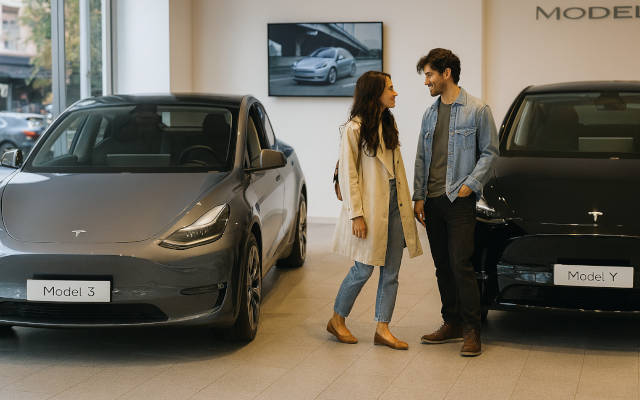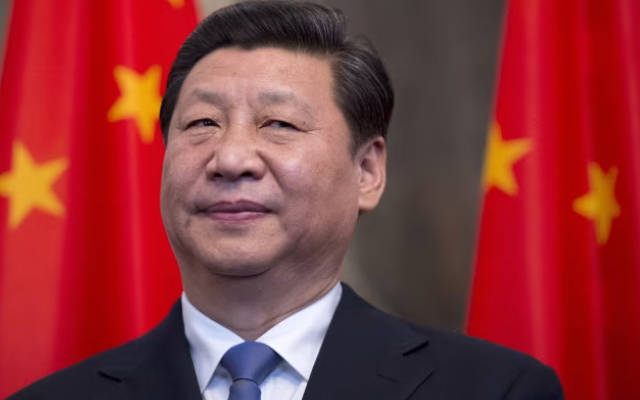 EDITOR'S PICK
EDITOR'S PICK
2027 Chevrolet Bolt: The Comeback Kid of Affordable EVs
09 Oct 2025 | Synopsis
 The 2027 Chevrolet Bolt returns as an affordable EV starting at $28,995, now with 150kW fast charging (10–80% in 26 mins), 210 hp, and 255-mile range. Built on the EUV platform, it offers more cargo space and updated tech, including an 11.3" touchscreen and optional Super Cruise. Three trims - LT, LT Comfort, and RS - launch in early 2026 from GM’s Kansas plant.
The 2027 Chevrolet Bolt returns as an affordable EV starting at $28,995, now with 150kW fast charging (10–80% in 26 mins), 210 hp, and 255-mile range. Built on the EUV platform, it offers more cargo space and updated tech, including an 11.3" touchscreen and optional Super Cruise. Three trims - LT, LT Comfort, and RS - launch in early 2026 from GM’s Kansas plant.Tesla's "Cheaper" Sub-$40K Model 3 and Model Y
09 Oct 2025 | Synopsis
 Tesla's new Model 3 and Model Y “Standard” variants, priced under $40K, offer strong range (321 miles) and core tech but cut premium features like powered seats, upgraded audio, and dual motors. The Model 3 is quicker and cheaper, ideal for commuters; the Model Y suits families. Deliveries begin late 2025. While TSLA stock dipped on launch, these models may boost volume and affordability without reinventing the platform.
Tesla's new Model 3 and Model Y “Standard” variants, priced under $40K, offer strong range (321 miles) and core tech but cut premium features like powered seats, upgraded audio, and dual motors. The Model 3 is quicker and cheaper, ideal for commuters; the Model Y suits families. Deliveries begin late 2025. While TSLA stock dipped on launch, these models may boost volume and affordability without reinventing the platform.Hydrogen Hits the Dirt: FIA Extreme H World Cup Debut
08 Oct 2025 | Synopsis
 The FIA Extreme H World Cup debuts in Qiddiya, Saudi Arabia, with hydrogen-powered Pioneer 25 race cars competing across time trials, head-to-head duels, and a final multi-car showdown. Drivers praise the car's performance and reliability, marking hydrogen's first competitive motorsport outing. Seven of eight teams hail from Scandinavia, with Saudi Arabia’s Jameel Motorsport as the local challenger. The event showcases zero-emission racing and Saudi innovation under Vision 2030.
The FIA Extreme H World Cup debuts in Qiddiya, Saudi Arabia, with hydrogen-powered Pioneer 25 race cars competing across time trials, head-to-head duels, and a final multi-car showdown. Drivers praise the car's performance and reliability, marking hydrogen's first competitive motorsport outing. Seven of eight teams hail from Scandinavia, with Saudi Arabia’s Jameel Motorsport as the local challenger. The event showcases zero-emission racing and Saudi innovation under Vision 2030.NY Times Upshot Cost Compares EVs vs. ICE Cars
08 Oct 2025 | Synopsis
 A New York Times Upshot analysis finds electric vehicles are now consistently cheaper to own than gas-powered cars. Lower fuel and maintenance costs, improved battery longevity, and stronger resale values make EVs the more economical choice - even without tax credits. Comparisons across popular models like the Ford F-150 Lightning, Hyundai Ioniq 6, and Tesla Model Y show savings of $5,000–$8,000 over ten years, positioning EVs as the default financial choice for most driver.
A New York Times Upshot analysis finds electric vehicles are now consistently cheaper to own than gas-powered cars. Lower fuel and maintenance costs, improved battery longevity, and stronger resale values make EVs the more economical choice - even without tax credits. Comparisons across popular models like the Ford F-150 Lightning, Hyundai Ioniq 6, and Tesla Model Y show savings of $5,000–$8,000 over ten years, positioning EVs as the default financial choice for most driver.The China Factor In The Great Progression Of The Next 25 Years
08 Oct 2025 | Synopsis
 China has transformed from rural poverty to high-tech megacities in 35 years, leading the global clean energy shift with massive EV and solar output. Yet its authoritarian model - marked by surveillance and censorship - raises concerns as it enters the AI age. The West must cooperate on climate tech but compete to ensure AI develops under democratic norms, not autocratic control.
China has transformed from rural poverty to high-tech megacities in 35 years, leading the global clean energy shift with massive EV and solar output. Yet its authoritarian model - marked by surveillance and censorship - raises concerns as it enters the AI age. The West must cooperate on climate tech but compete to ensure AI develops under democratic norms, not autocratic control.
 EVWorld Exclusive
EVWorld Exclusive
Unlocking Heat's Hidden Potential: How a Nanoscale Discovery Could Transform Everyday Tech
24 Oct 2025 |  A recent nanoscale physics breakthrough reveals heat can transfer across tiny gaps far more efficiently than expected - up to 100 times greater than classical predictions. This could revolutionize cooling and energy systems in electronics, EVs, and smart appliances. While engineering challenges remain, early applications may emerge within 3-5 years, with broader consumer adoption possible in the next decade. The future of heat management may be silent, solid-state, and radically efficient.
A recent nanoscale physics breakthrough reveals heat can transfer across tiny gaps far more efficiently than expected - up to 100 times greater than classical predictions. This could revolutionize cooling and energy systems in electronics, EVs, and smart appliances. While engineering challenges remain, early applications may emerge within 3-5 years, with broader consumer adoption possible in the next decade. The future of heat management may be silent, solid-state, and radically efficient.
Turning the Energy Crunch into a Smart Grid Revolution
24 Oct 2025 |  America's energy crunch is not about supply - it's about coordination. Virtual power plants and vehicle-to-grid systems offer a scalable, software-driven solution to rising demand from AI, EVs, and climate volatility. By turning homes, vehicles, and businesses into active grid assets, and aligning policy with technology, the U.S. can build a smarter, more resilient energy future without building more power plants. The tools exist - now it's time to connect them.
America's energy crunch is not about supply - it's about coordination. Virtual power plants and vehicle-to-grid systems offer a scalable, software-driven solution to rising demand from AI, EVs, and climate volatility. By turning homes, vehicles, and businesses into active grid assets, and aligning policy with technology, the U.S. can build a smarter, more resilient energy future without building more power plants. The tools exist - now it's time to connect them.
Auto Retail in 2025: Bridging the Trust Gap Between Dealers and Buyers
24 Oct 2025 |  The 2025 Urban Science and Harris Poll report reveals a growing disconnect between dealers and buyers. While dealers embrace EVs, AI, and digital tools, many buyers remain cautious - especially about full electrification and online-only retail. Brand loyalty is weakening, and policy clarity is key to adoption. The future of auto retail depends on bridging trust, flexibility, and infrastructure gaps.
The 2025 Urban Science and Harris Poll report reveals a growing disconnect between dealers and buyers. While dealers embrace EVs, AI, and digital tools, many buyers remain cautious - especially about full electrification and online-only retail. Brand loyalty is weakening, and policy clarity is key to adoption. The future of auto retail depends on bridging trust, flexibility, and infrastructure gaps.
Electric Icons in the Making: Audi Concept C vs. Chevrolet Corvette EV
23 Oct 2025 |  Audi's Concept C previews a refined electric GT built on the mature PPE platform, likely arriving by 2026. Chevrolet's Corvette EV promises supercar performance but faces packaging and thermal challenges. Audi is closer to production; Corvette remains in early development. Both reflect divergent strategies in electrifying legacy sports cars, with Audi emphasizing platform maturity and Chevrolet pursuing brand continuity through engineering innovation.
Audi's Concept C previews a refined electric GT built on the mature PPE platform, likely arriving by 2026. Chevrolet's Corvette EV promises supercar performance but faces packaging and thermal challenges. Audi is closer to production; Corvette remains in early development. Both reflect divergent strategies in electrifying legacy sports cars, with Audi emphasizing platform maturity and Chevrolet pursuing brand continuity through engineering innovation.
Electrification Is Not an Oversimplification
23 Oct 2025 |  Despite critiques that the quest for global electrification is "simplistic", the transition is strategic and necessary. Grid upgrades, battery innovation, and tailored policies make electrification viable. Sodium-ion batteries and recycling reduce material risk. Compared to fossil fuels, electrification offers cleaner, safer, and more resilient systems. Complexity demands better design - not delay.
Despite critiques that the quest for global electrification is "simplistic", the transition is strategic and necessary. Grid upgrades, battery innovation, and tailored policies make electrification viable. Sodium-ion batteries and recycling reduce material risk. Compared to fossil fuels, electrification offers cleaner, safer, and more resilient systems. Complexity demands better design - not delay.
 24 Oct 2025 20:29:50 UTC |
RECENT PODCASTS
What Battery Chemistry Wins - Ontario Nuclear Investment - Battery Storage Boom
SEARCH RSSTREAM
 57 New Postings In Past 24 Hours
57 New Postings In Past 24 Hours
Category:mobility
Region:NoAmerica
Date:24 Oct 2025
Category:mobility
Region:NoAmerica
Date:24 Oct 2025
Category:mobility
Region:NoAmerica
Date:24 Oct 2025
Category:mobility
Region:NoAmerica
Date:24 Oct 2025
Category:finance
Region:NoAmerica
Date:24 Oct 2025
Category:mobility
Region:NoAmerica
Date:24 Oct 2025
Category:finance
Region:NoAmerica
Date:24 Oct 2025
Category:finance
Region:NoAmerica
Date:24 Oct 2025
Category:mobility
Region:NoAmerica
Date:24 Oct 2025
Category:mobility
Region:AsiaPacific
Date:24 Oct 2025
Category:mobility
Region:AsiaPacific
Date:24 Oct 2025
Category:mobility
Region:AsiaPacific
Date:24 Oct 2025
Category:finance
Region:NoAmerica
Date:24 Oct 2025
Category:finance
Region:AsiaPacific
Date:24 Oct 2025
Category:mobility
Region:AsiaPacific
Date:24 Oct 2025
Category:energy
Region:IndoAsia
Date:24 Oct 2025
Category:mobility
Region:IndoAsia
Date:24 Oct 2025
Category:review
Region:AustralPacific
Date:24 Oct 2025
Category:mobility
Region:Europe
Date:24 Oct 2025
Category:mobility
Region:NoAmerica
Date:24 Oct 2025